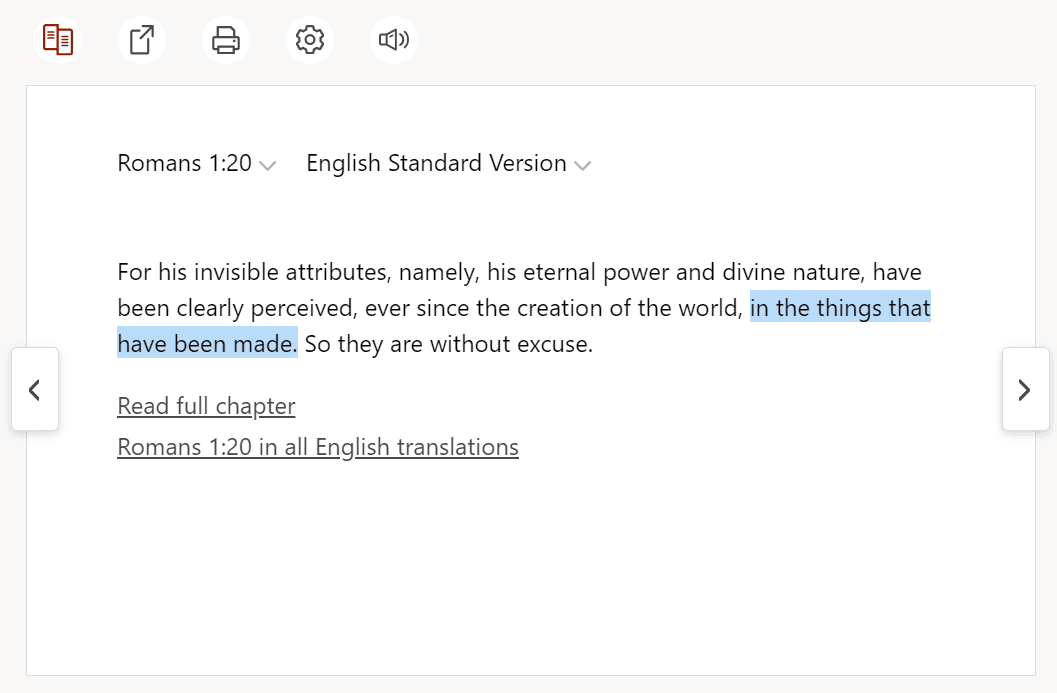
The God Who Cares
 img:biblegateway.com
img:biblegateway.comEarly on in human history, God revealed Himself in both justice and mercy.
When I say “early”, I’m understating things.
From the beginning God revealed Himself in justice and mercy.
Every action made by the first man and woman was held up to the light of God’s revealed will.
Where they acted wrongly, there were Godly consequences; where they acted rightly there was Godly peace.
That’s justice.
Where they acted wrongly, God provided a substitute for the eternal consequences, and where they acted rightly God Himself was the author of their righteousness.
That’s mercy.
That’s the character of God; He envelops His creation in divine justice and mercy.
The Revealed God
The Bible tells the story of how God continued to reveal Himself, culminating in the ultimate reveal: Jesus Christ is God in human flesh.
During the centuries between God’s initial revelations about Himself and His ultimate revelation in Jesus, the world waited.
But God was not silent. Prophet after prophet was sent to reiterate and reinforce the divine revelation that God is all-in on justice and mercy.
Guilt is always punished while a substitute is always provided to bear the guilt - God’s justice and mercy for milenia.
The theme is repeated over and over in written (and inspired) Word.
You might say that all those centuries taught God’s people how to listen.
A large part of that lesson is contained in the volume of stories about how God’s people refused to listen, though God made sure that there was always a “remnant” who maintained faith in Him.
From the good examples to the bad ones, we have learned a thing or two about how to listen to God.
We go on to observe that after Jesus was born, died, rose again and ascended, the practice of listening to God didn’t change.
And so you could examine the history of the world in three phases.
Pre-Jesus history, when God revealed Himself in Justice and Mercy through the voice of His prophets.
Jesus’ lifetime on earth, when God revealed Himself in Justice and Mercy by becoming a man and speaking directly with us.
Post-Resurrection history, when God revealed Himself in ongoing Justice and Mercy through the voice of His apostles.
To summarize those three phases of human history, we observe that at every point in history, God reveals Himself in Justice and Mercy through His Word.
God’s Word always reveals God.
Beyond Human Limits
Emotion plays a big role in the various ways people try to listen to God.
It is true that human beings can and will have an emotional reaction when God reveals Himself.
Rudolph Otto, in The Idea of the Holy, claimed to identify a human emotion that is common to all people: the feeling of awe at powers greater than anything human.
I can definitely lay claim to having experienced that emotion many times, especially in the Wyoming mountains.
Surely you have felt it as well, in the thunder and lightning, the aurora borealis, or in the harrowing images of the path of a tornado.
But while the revelation of God can and will produce emotion, it is never quite enough to rely solely on emotion for accuracy.
For example, some people’s emotional response to the vastness of the cosmos - which is certainly a feeling of awe at powers greater than anything human - some people contemplate the great void of space and conclude that alien creatures from other planets are coming, either to annihilate or to save us.
Emotions can be misleading.
Another common human mechanism for attempting to listen to God is the application of mathematical logic and empirical testing.
There is a conviction among many that the only reliable pathway to Truth (note the “capital T”) is through rigorous and controlled repetition.
Gravity - which is certainly a power greater than anything human - exists in many people’s minds only because it can be “proven”.
Drop a brick on your foot. Gravity works every time.
Because it is such a reliable “law”, it is real - beyond question.
Fortunately, God has created a world which does function in this way.
Seed + soil + water + light = food.
Thank God for science!
The revelation of God can be measured, analyzed, and even illuminated by the empirical sciences.
However, like emotions, the empirical sciences can be misleading too.
For example, in the absence of God’s Word, empirical sciences can tell us very little about the metaphysical (or “spiritual”) forces in the world.
Neither emotion nor mathematics is designed to reveal God, they are designed to respond to the God who has already revealed something worthy of response.
The God who reveals Himself through His Word can be reached only through that Word.

What God Finally Reveals
The passage from Romans at the top of this essay reminds us that God’s self-revelation can be perceived as “real” by virtue of the fact that you and I are here to observe it.
Paul is saying that the humanistic mechanisms like emotion and science provide sufficient data to be able to know that God is.
But as Romans will go on to say, if you want to know more and more about who God is in detail, there is no substitute for the Word.
It should surprise nobody, then, that when God became human in Jesus, He referred to Himself as “the Word made flesh”.
Jesus speaks God’s Word because Jesus is the Word of God.
The rest of the Bible claims equal authority. It’s God’s Word.
And so we listen to God by hearing His Word.
We learn about His mighty acts of Justice and Mercy.
Those acts do not interpret themselves.
Why would Jesus curse a fig tree? He did, you know.
And the tree withered.
That’s a power which is greater than anything human.
On the surface it might invite a picture of a fickle Jesus, a spiteful Jesus, an uncaring Jesus, a reckless Jesus… a Jesus who hates agriculture!?!
Based on an emotional response to Jesus cursing a fig tree, one might end up with a disastrous picture of God.
So God’s mighty acts must be interpreted through what He has revealed about Himself in Justice and Mercy.
Interpreted through the already-revealed-and-therefore-known characteristic that God is just and merciful, we can move to a more nuanced understanding of that fig tree episode.
For anyone who will listen to Jesus interact with that fig tree, then matrix that with justice and mercy, one begins to see that Jesus is teaching us about the temple in Jerusalem.
The same temple He is about to turn upside down to make room for the once-for-all sacrifice of his own flesh and blood.
The God Who Cares
As we (and those we speak with) grow to know more about the God who revealed Himself through verbalizations and propositions, we are drawn mostly to the death and resurrection of Jesus Christ.
This unique expression of God’s Word - communicated as information - begins to form an acquaintanceship with God.
When that mighty and more-powerful-than-anything-human revelation begins to sink in, what begins as information becomes trust.
In the end, even faith is formed by God’s Word!
And in the end, we are not left with an unattractive picture of God.
We see a God who takes such an interest in the affairs of His created world that He chose to involve Himself personally, whole-heartedly, intelligently, and always in justice and mercy.
We see a God who takes an interest in you.
In the end, we trust in the God who cares.
Closing Prayer
Dearest Jesus, help the world to hear the truth about you. Give courage to those who have been sent into the world as missionaries. Give words to your entire church on earth, so that many more might be saved. Amen.



